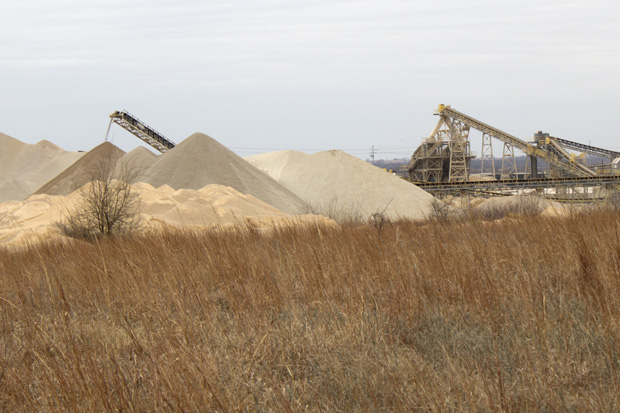
An active aggregate mining operation near Mill Creek, Okla.
Logan Layden / StateImpact Oklahoma


An active aggregate mining operation near Mill Creek, Okla.
Logan Layden / StateImpact Oklahoma
This isn’t the first legislative session some Oklahoma lawmakers are pushing for a severance tax for mining limestone and sand, but it’s the first time the idea has gotten this far.
On Monday, the House Appropriations and Budget Committee passed HB1876, which would allow up to a five percent tax on the production of limestone, sand, and other aggregates. It now moves to the full house for consideration.
But there are several caveats: It would only be a county-level tax for specific infrastructure improvements, couldn’t be enacted until county commissioners bring the issue to a vote of the people, and the severance tax would only apply to material sold in other counties or states.
As StateImpact has reported, residents, particularly in heavily mined Johnston County and on the sensitive Arbuckle-Simpson Aquifer, want something more for sacrificing their natural resources. When limestone is shipped to Texas to be sold, it’s cities and towns there that benefit from the sales tax on it.
Johnston County District 2 Commissioner Mike Thompson told StateImpact about the mining companies, “we appreciate what they do, employment and everything. But we would like to have our fair share that’s leaving the state.”
But the Oklahoma Aggregates Association, which represents the mining industry and strongly opposes a severance tax, points out in literature circulated at the capitol that the tax would have to paid when limestone and sand is sent to any other country, whether in Texas or Oklahoma.
During debate before the House Appropriations and Budget Committee Monday, the bill’s author, Rep. Charles McCall, R-Atoka, said: “There’s nothing going to be imposed unless it’s the will of the people of that particular county.”
Speaking in opposition, Rep. Mike Brown, D-Tahlequah, put it very simply at the end of his argument: “I urge you to vote no on a tax increase.”
And you read that right. That’s a Republican arguing for the authorization of a new tax, and a Democrat speaking against the idea.